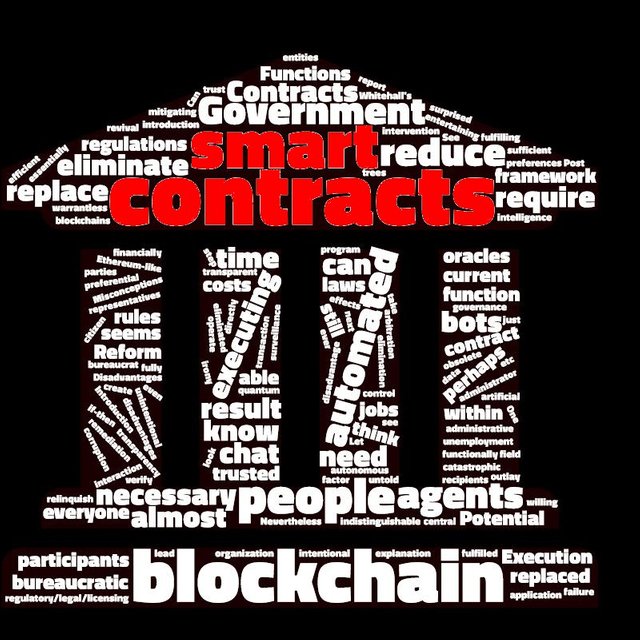Blockchain instead of Bureaucrats? Smart Contracts and Streamlining Government.
Blockchain instead of Bureaucrats? Smart Contracts and Streamlining Government.
Reading The Guardian article "Robots could replace 250,000 UK public sector workers'", perhaps the most entertaining quote was "...artificial intelligence 'chat bots' could replace up to 90% of Whitehall's administrators...". Imagine my surprise to have the beliefs of almost everyone I know confirmed: government is a bloated bureaucratic nightmare populated by administrators fulfilling the function of automated telephone menus.
The only thing that surprised me about the report was that the Reform thinktank - co-founded by a government MP - is given credit for realizing that most governmental administrative jobs are a complete waste of money, time and human potential. Oh, the irony!
Government administrators and bureaucrats are supposed to operate within an if-then framework comprised of rules, regulations and laws. They serve as intermediaries between the citizen and the regulatory/legal/licensing framework of the government. One could almost consider them nodes in a network, each running its own "if this then that" program. Can the function of bureaucrats be fulfilled by automated agents executing a smart contract in a blockchain environment?
A blockchain is essentially a database that is directly and safely shared by entities that do not trust each other and that does not require a central administrator. For an excellent introduction to smart contracts, watch Simple Introduction to Smart Contracts on a Blockchain (linked at the end of this contribution with all other references).
If, as Reform claims, "90%" of government administrators and bureaucrats can be replaced by chat bots, it seems they are ripe for replacement by autonomous agents executing smart contracts. There are arguments for and against taking such a step, let's take a closer look.
Potential Advantages of Smart Contracts in Governance
- Smart contracts would reduce the time necessary to complete any task that could be placed on a blockchain or "performed by chat bots". The elimination of human beings as intermediaries would represent a quantum leap in processing speed.
- Smart contracts would reduce payroll costs. Reducing the number of government administrators and bureaucrats could (under just governance) result in less taxation.
- Smart contracts could reduce corruption and create a level playing field for everyone. Human bureaucrats are the agents that privilege or disadvantage applicants based on personal preferences, back room deals or bribery.
- Smart contracts could reduce transaction costs (primarily application fees that contribute to sustaining bureaucrats' jobs or that are necessary for funding the organization and its torrential deluge of paperwork).
- Smart contracts could result in a paperless licensing/permit/application system, saving untold numbers of trees.
- Smart contracts could lead to a revival of government "by the people, for the people".
Potential Disadvantages of Smart Contracts in Governance
- Smart contracts could result in higher unemployment as many government administrators and bureaucrats would be functionally obsolete. A mitigating factor here is that government bureaucrats are financially indistinguishable from welfare recipients in terms of government outlay. Nevertheless, not all administrators and bureaucrats could be dismissed. This is because 'oracles', people who would be needed to enter trusted data into the blockchain, would still be necessary (See: Three Smart Contract Misconceptions).
- Smart contracts could be gamed by loopholes in the code, be the intentional or unintentional. This danger is mitigated but not eliminated by complete transparency for all participants. (For a good explanation, see Michael Mainelli and Bob McDowell's Why smart contracts need shrewder people .)
- Smart contracts would require making the labyrinth of knock-on effects of current rules, regulations and laws more transparent for participants.
- Smart contracts operating on a governmental blockchain would need to be able to interact with external blockchains to be able to verify sufficient funds, identity documents, etc. to establish a trusted entity and eliminate the need for additional oracles.
- Smart contract failure would still require human intervention, arbitration and/or remediation.
- Smart contracts on a governmental blockchain could be catastrophic for individual privacy. Though how exactly it could be worse than the current situation of arbitrary warrantless surveillance without oversight by elected representatives is unclear.
- It is highly unlikely a government of people would be willing to relinquish bureaucratic control to a blockchain that could be audited at any time to eliminate preferential practices for favored parties.
I am still wrapping my head around the potential of the blockchain environment, but in my opinion it seems clear that most government bureaucrats and administrators not only could, but should be replaced by impartial and efficient automated agents capable of executing smart contracts. I can easily envisage almost every interaction I have ever had with a government bureaucrat being fully automated within an Ethereum-like environment (or perhaps even using Ethereum itself) in the next few years at a touch-screen kiosk with a document scanner.
Could smart contracts on a blockchain eliminate government bureaucrats? Are there any advantages or disadvantages you can think of not addressed here? Could smart contracts and blockchain replace or revamp government as we know it? What do you think? Let me know!
- Cupid Zero
References:
https://www.theguardian.com/technology/2017/feb/06/robots-could-replace-250000-uk-public-sector-workers

